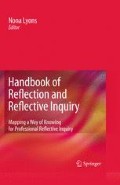Abstract
This chapter explores the relationships between inquiry, presence, and civic capacity in teaching. More specifically, it looks at the critical skill of descriptive inquiry, its place in the larger scheme of reflection, and its role in the cultivation of presence and civic capacity. Drawing largely on John Dewey and Patricia Carini, I explore two modes of inquiry in which presence might be cultivated and civic capacity developed: the descriptive review of children and children’s work (Himley and Carini 2000; Carini 2001; Rodgers 2006b), and descriptive feedback (Rodgers 2006b). I claim that the discipline of descriptive inquiry is a means of acknowledging and drawing upon the vast capacity of all teachers and learners, as human beings, to shape their individual and collective experience.
Access this chapter
Tax calculation will be finalised at checkout
Purchases are for personal use only
Notes
- 1.
Many similar processes have been developed by others since, including Collaborative Assessment (Seidel 1998), the Tuning Protocol (Blythe et al.), and Critical Friends Groups. However, the Prospect processes are distinct in that they are committed to being processes always under examination and in the making, rather than protocols, which are more fixed.
- 2.
For an in-depth description of the descriptive review process please see Rodgers (2006b).
- 3.
I am, as always, grateful to my former colleagues at the School for International Training (SIT) in Brattleboro, Vermont for teaching me the value of feedback. It was introduced to SIT by Caleb Gattegno in the early 1970s and further developed at SIT under the name “structured feedback,” a term coined by Kathleen Graves and Donald Freeman in the 1980s.
- 4.
The internal and external barriers to conducting descriptive feedback remains an area in need of further inquiry.
- 5.
The length of this chapter prohibits a longer, thicker, description of an actual review session. A more fine-toothed account of an actual descriptive review can be found in Rodgers (2006b).
- 6.
All names are pseudonyms.
References
Blythe, F. Allan D, Powell, B. S. (2006) Looking Together at Student work: A companion guide to assessing on student learning (2nd ed.). Teachers College Press.
Carini, P. F. (2001). Starting strong. A different look at children, school, and standards. New York: Teachers College Press.
Carini, P. (2001) Puts of our lever, in P. Carini, STARTING STRONG, Teachers college press, New York.
Dewey, J. (1916/1980). Democracy and education. In J. A. Boydston, P. R. Baysinger, & B. Levine (Eds.), John Dewey: The middle works, 1899-1924 (vol. 9). Carbondale and Edwardsville: Southern Illinois University Press.
Dewey, J. (1933). How we think. Lexington, MA: D.C. Heath and Co.
Dewey, J. (1934). Art as experience. New York: Perigree Books.
Dewey, J. (1938). Experience and education. New York: Collier Books.
Fine, M., & Weis, L. (2003). Silenced voices and extraordinary conversations. New York: Teachers College Press.
Hansen, D. T. (ed). (2006). John Dewey and our educational prospect: A critical engagement with Dewey’s democracy and education. New York: Teachers College Press.
Himley, M., & Carini, P. F. (2000). From another angle: Children’s strengths and school standards. New York: Teachers College Press.
Meares, M. (2003). Voice, agency, and engagement: Narratives of negative work experiences from employees from traditionally muted groups. Paper presented at the Annual Meeting of the International Communication Association, Marriott Hotel, San Diego, CA, 27 May 2003. Online PDF 2008-09-29.
Miron, L. F., & Lauria, M. (1998). Student voice as agency: Resistance and accommodation in inner-city schools. Anthropology & Education Quarterly, 29(2), 189-213.
Palmer, P. (1998). The courage to teach. San Francisco: Jossey-Bass.
Rodgers, C. (2002a). Defining reflection: Another look at John Dewey and reflective thinking. Teachers College Record, 74(4), 842-866.
Rodgers, C. (2002b). Seeing student learning: Teacher change and the role of reflection. Harvard Educational Review, 72(2), 230-253.
Rodgers, C. (2006a). Attending to student voice: The impact of descriptive feedback on learning and teaching. Curriculum Inquiry, 36(2), 209-227.
Rodgers, C. (2006b). Experience as art: The process of valuing and appreciating the work of children in teacher education. Teacher Education and Practice, 19(4), 434-454.
Rodgers, C., & Raider-Roth, M. (2006). Presence in teaching. Teachers and Teaching: Theory and Practice, 12(3), 265-287.
Schön, D. (1983). The reflective practitioner. New York: Basic Books.
Seidel, S, (1998). Learning from looking in N. Lyons (editor), 1998, With Portfolio in Hand, Validating the new teacher professionalism, Teachers College Press, New York.
Simon, K. G. (2001). Moral questions in the classroom. New Haven: Yale University Press.
Acknowledgments
I wish to acknowledge the students who so graciously agreed to share their work. I also want to acknowledge the immensely helpful feedback from my colleagues, Claire Stanley and Kathleen Graves, on an earlier draft of this chapter. My grateful thanks also to Miriam Raider-Roth and James Garrison for their very thoughtful and provocative reviews of this chapter.
Author information
Authors and Affiliations
Corresponding author
Editor information
Editors and Affiliations
Rights and permissions
Copyright information
© 2010 Springer Science+Business Media, LLC
About this chapter
Cite this chapter
Rodgers, C. (2010). The Role of Descriptive Inquiry in Building Presence and Civic Capacity. In: Lyons, N. (eds) Handbook of Reflection and Reflective Inquiry. Springer, Boston, MA. https://doi.org/10.1007/978-0-387-85744-2_3
Download citation
DOI: https://doi.org/10.1007/978-0-387-85744-2_3
Published:
Publisher Name: Springer, Boston, MA
Print ISBN: 978-0-387-85743-5
Online ISBN: 978-0-387-85744-2
eBook Packages: Humanities, Social Sciences and LawPhilosophy and Religion (R0)

